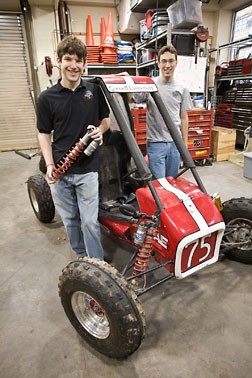Engineering teams create cutting-edge designs while honing entrepreneurial skills
By Kathy Hovis
For Mark Yerdon '08 and Michael LaRose '08, the basement of Upson Hall is a second home. The space — filled with parts of model planes and submarines, motors, engines and robotic arms — contains all the parts for two Baja racing cars that they will take to competitions in May and June.
The Baja team is one of 16 such student project teams in the College of Engineering "[that] provide our students an opportunity to work in a real-world environment centered on solving an engineering problem," said Matt Ulinski, the Hansen Director of Instructional Labs for the Sibley School of Mechanical and Aerospace Engineering. "Each team is in essence its own company: Their product is what they create for their competition."
Team members earn four credits, on average, for their work on student teams, Ulinski said. But the hours they put in are above and beyond what a four-credit course would normally require. "For many students, whatever social or recreational time they have, they're putting into these projects," he said. "These are some highly motivated students getting the maximum benefit from their Cornell experience."
Many of the student-led teams participate in competitions each year, where they face other school or industry teams. The Baja racing team, which designs, builds and tests off-road vehicles, will participate in its fourth contest this year, sponsored by the Society of Automotive Engineers. This year, the team will also enter a car in the East region competition, which involves navigating through water.
The contests require students to design and build a car to climb, pull loads, accelerate quickly and so on, as well as to develop business plans for producing the car and generate financial support for their project.
"Not only do student project teams have to work in the world of engineering and physics, but also in the world of management, budgets and logistics," Ulinski said. "With budgets ranging from several thousand dollars to several hundred thousand dollars and competitions that span the world, our project teams create a unique learning environment for Cornell engineering students — one not duplicated at many other institutions."
Yerdon said he's gained valuable skills as the team leader. "I've learned a lot about managing people and making sure they're doing their work," he said.
Cornell's Autonomous Underwater Vehicle (CUAUV) team builds robotic submarines to perform a complex set of maneuvers in annual competitions.
"In a lot of my classes, I learn how to implement one segment of a project, but here I need to take techniques I've learned in multiple disciplines and put them together in one system," said Sam Fladung '08, CUAUV team leader. The team functions like a business -- various subgroups complete sections of the project, such as the battery, internal structure and power system. The team even has a public relations subgroup to handle its Web site and publicity.
Fladung said he's learned a valuable entrepreneurial skill -- balancing multiple tasks while trying to please corporate sponsors and donors, who want to be updated frequently on team progress.
Kathy Hovis is a writer/editor for Entrepreneurship@Cornell.
Media Contact
Get Cornell news delivered right to your inbox.
Subscribe